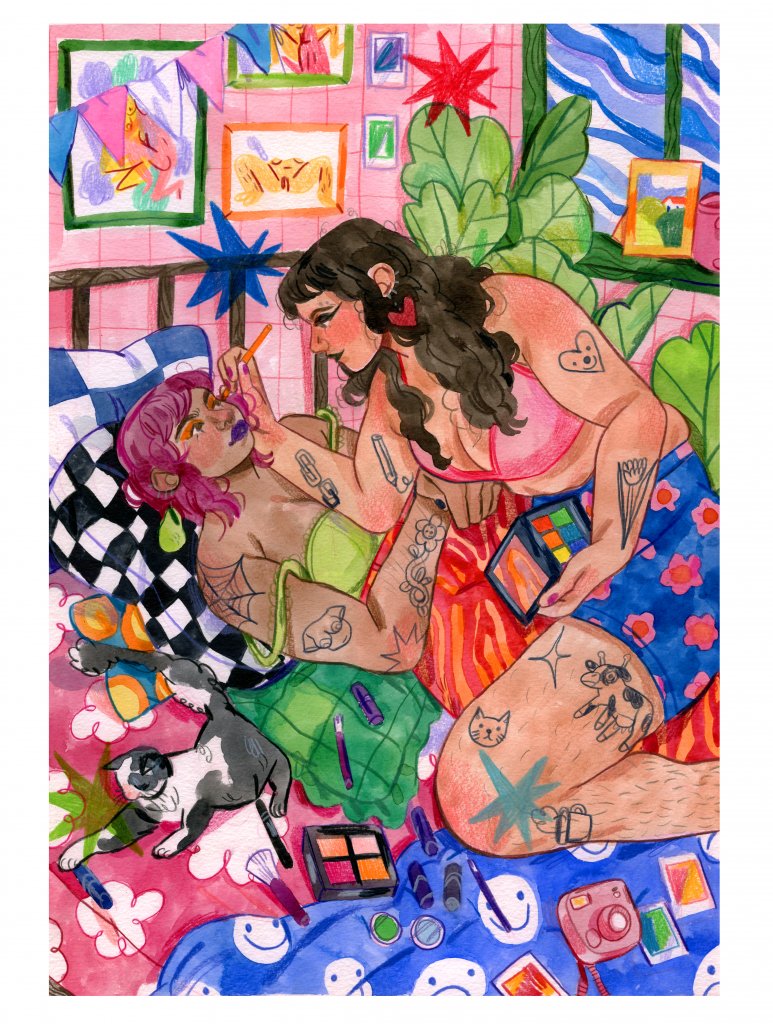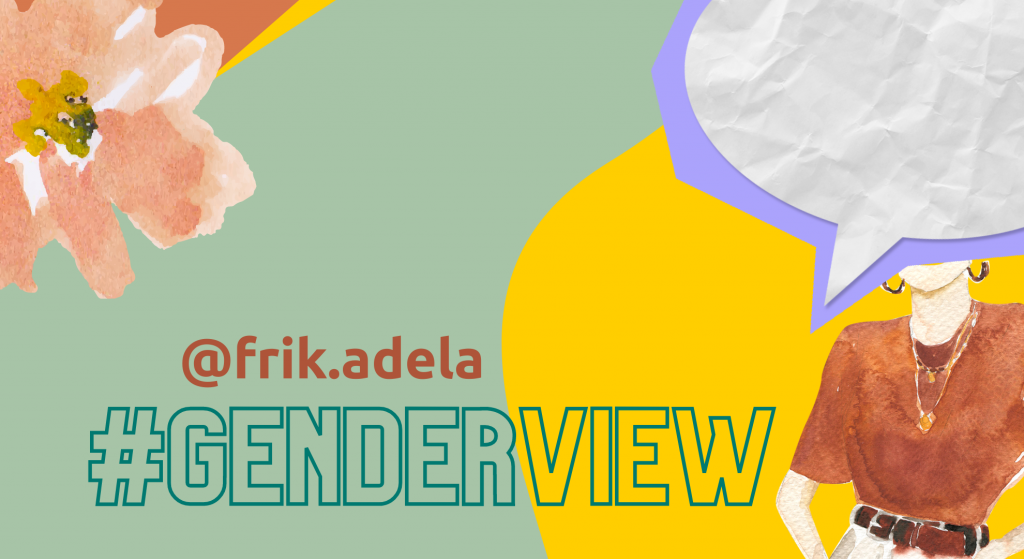Interview by Sofia Konstantopoulou
fri.kadela: We spoke with the creator who througt that her paintings capture thoughts about feminism. Her choices made Frik.adela, as a painter, not care at all if she became annoying talking about gender. Well, we didn’t get annoyed at all!
#Genderviews, the Genderhood column with views on the free expression of our genders, reveals frik.adela’s point of view for a daring painting.
You are a psychologist, you are young, you are someone who found herself in the South while you are from the North. Tell us a few things about yourself and your relationship with the project.
Indeed, I am from a town – in fact a village – next to Thessaloniki and since I was 17 I have been in Rethymnon to study. The studies are over, as is my time in Rethymnon, so now it remains to be seen what I will do with the degree. I never took drawing seriously, but I think I’ve always been painting. At some point in elementary school I started classes but this phase ended ignominiously because I had to choose between French and painting and my desire to go to Disneyland won – I would still pick the same even now. Over time, drawing was limited to something I did during math class at school, when we were making up stories with my classmates because we did not understand anything about x and y. Sometime when I was in high school, I announced to my parents that I wanted to sit the exam for fine arts school. They didn’t take it that well. Over time, my relationship with drawing has been unstable, but it has somehow become more fixed in the last few years, and I hope it continues that way.
You started designing and immediately the themes you picked were related to breaking gender stereotypes. Do you want to describe to us how this happened?
The truth is that they were not directly related to those themes. if anyone scrolls down my page they will see completely cheesy posts – I was experiencing erotic frustration when I made the page. However, from the beginning there was some direction towards gender but this is something that was not done in a targeted way. I draw and write about things I hear, or experience in any way so my identity as a woman would of course be related to my drawings or the reasons I create. It’s daily life. In the meantime, different people started texting me about similar experiences, so I was even more annoyed and felt that I could not stop expressing myself about them. We have to talk about our daily oppression no matter how “tired” we are because we have to keep the debate about our place in the patriarchal reality going. Sharing our experiences is one of our ways of staying united, giving and taking courage, listening and claiming. Mutual support is one of our strongest tools against the oppression in which we are called to survive, whether we find the support we need in our friends, or in our actions, or in our non-human animals, or in an Instagram post.
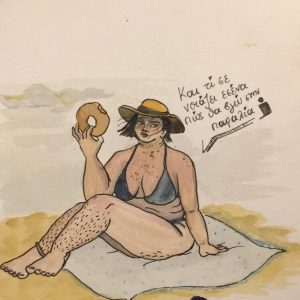
Your drawings depict bodies that are not always part of what society calls a “female role model.” What makes you capture sometimes skinny and other times body positive bodies?
Most of the women around us are fat, with cellulite, thick calves, no breasts, sagging breasts. The majority of women around us have gone through at least one phase in their lives when they did not feel good about their bodies. Growing up, I had people criticizing me whether I was gaining weight or losing it. The body always needed something to be good enough. Pretty good based on what? Model proportions in the 90’s? We grow by projecting our female body with the perfect proportions, the perfect height, the perfect hair, the perfect face. We end up having stress because we gained 5 pounds after Easter. We end up yelling at women around us because they wear leggings and they are fat, horizontal stripes and they have a belly, shorts and they have cellulite while at the same time we adjust our stylistic choices, trembling lest someone find something to comment on in our own body. We are not stupid or superficial as men think. They raise us that way. Xiarchos was right when he said that he was taught from an early age that he should not wear horizontal stripes if he is fat. I’ve really been hearing that since I was a child. They teach us from a young age which clothes are prohibitive for our bodies, displaying our “imperfections” from the age of 12 and until the age of 17 we know that you do not wear leggings without a straight butt, you do not wear fits if you are fat, you do not wear heels if you are tall etc. It is difficult to eliminate these images and sounds from within us and it takes real strength to put on the tight dress and ignore the looks on the street, not to let them affect you. I say that while on the safe side as I am not a fat person and I can not speak on their behalf. The reason I try to portray not only thin women in my drawings is because I try to portray the women I see around me and not in the ad campaigns.
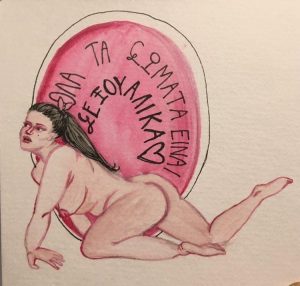
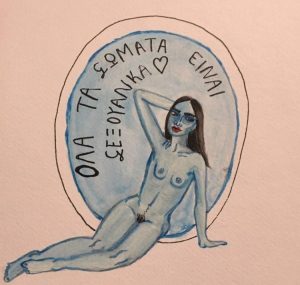
“We have to talk about our daily oppression no matter how "tired" we are because we have to keep the debate about our place in the patriarchal reality going.”
You are a feminist. How does feminism appear in your life or better how do you apply it in your daily life?
I try from very small things to bigger ones. I personally started by correcting my friends when they said “sexist” jokes. Over time, a lot of effort was extended to the realization that I have autonomy in my body and I slowly started to go out without caring how my hair looks, in order to get used to the idea that others shouldn’t care either. At the same time, reading helped me a lot, from simpler ones such as analyses in magazines to books. One of the most difficult things was deciding to cut ties with people whose choices / lifestyles offended who I am. I can not go out for a beer and end up arguing about why we do not whistle at women on the street. Sometimes you just have to be more picky with the help you render toward other people, even if they are childish friends. It’s part of growing up.Finally, it is applied daily by choices we make during the day, to accompany our friend home, to look angrily at the guy who is harassing us on the street, to defend the girl who was groped in the bus, to go to the anti-sexist course, to explain to our aunt why we do not want children and especially not to be strict with ourselves if one day we do not do any of all this.
Nowadays there is talk about toxic masculinity. Have you met allied male role models?
Yes. But coincidentally, none of them were straight men. I have met cis straight men who are not as sexist as the rest but never someone I consider an ally. Almost everyone has been oppressive, violating, abusive. Many understood it and apologized sincerely, some never understood it and some pretended to understand it. For me, the most dangerous are the last ones. It scares me that some people pretend to be anti-sexist to gain our trust for their own reasons while at the same time commenting on our bodies with their friends or reaching out to them. I do not think everyone is the same. However, growing up in a favorable environment for them, it is difficult and inconvenient to reject behaviors that stem from their privilege. However, as long as I live I hope.
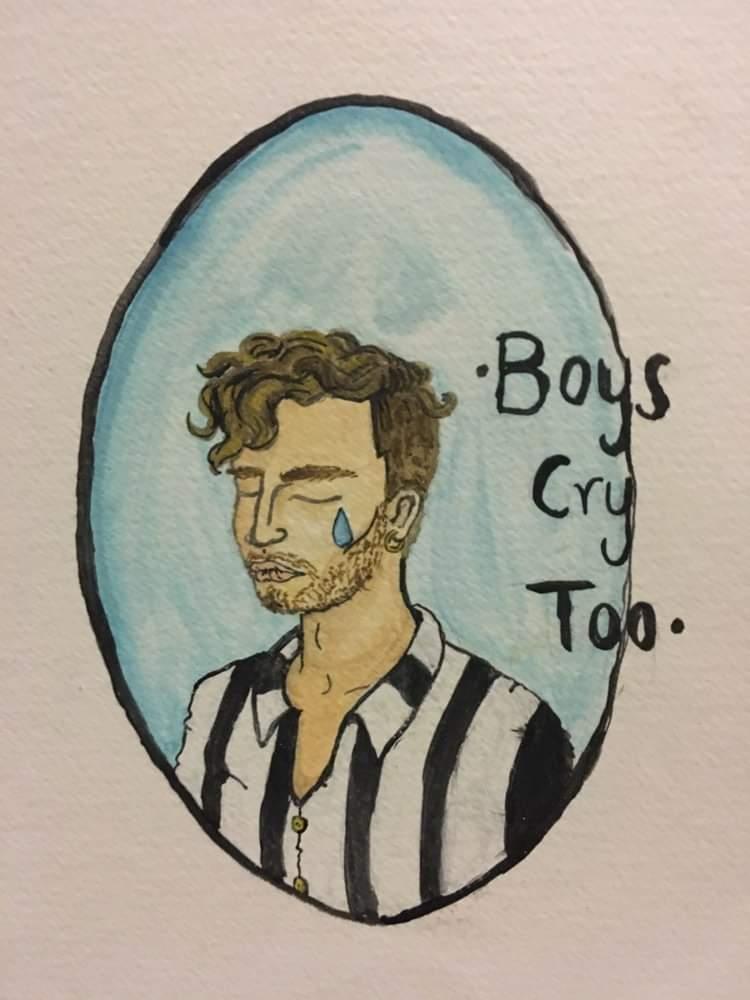

What would you say to a young person who draws to encourage them to publish their own creations?
To not be strict with their art. We must reject the idea of good and bad art. Art is art even if the color comes out of the lines. Instagram as a platform helps due to popularity, stories, notifications. Personally it helped me a lot to follow other pages as I get ideas, try things and ask for advice. The first step is to make the decision to show their art and overcome the fear of a possible rejection. The recognition we seek does not come straight away but over time we begin to feel better about our plans, we get used to sharing them and we improve.
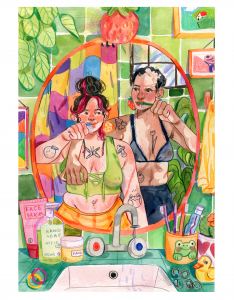
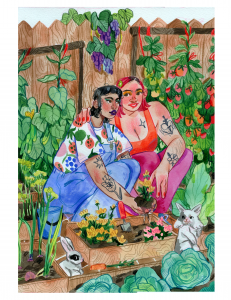
Your audience is mainly from America, Britain and France. But in the last year you have gained a larger audience in Greece as well. How does the Greek public react to your drawings?
Very positively and I am very grateful for that. I never thought that my art would resonate in Greece and it makes me very happy that my initial belief was not confirmed.
Have you considered the next step in your art?
I intend to study illustration at a university abroad.
What would you advise a young person who draws to encourage them to publish their own creations?
To upload what you want and not what you think others want from you. You will always find your audience. Rest when you need it and do not be kept away from your art by what social media algorithm dictates.
